Comparative Business Ethics and Social Responsibility in Mining
VerifiedAdded on 2023/01/19
|11
|2306
|84
Essay
AI Summary
This essay delves into the realm of corporate business ethics and social responsibility, using the Australian mining industry's stance on climate change as a case study. The essay examines the ethical and moral implications of the industry's actions, particularly its disregard for climate change risks and its reluctance to incorporate climate change policies into its operations. It explores the legal ramifications of these actions, highlighting potential breaches of environmental and climate-related legislation. The analysis extends to various moral and ethical perspectives, including social justice, human rights, and utilitarianism, to evaluate the ethical shortcomings of the mining companies. Furthermore, the essay discusses relevant ethical and moral philosophies, such as utilitarianism, social justice theory, social contract theory, and virtue theory, to provide a comprehensive understanding of the issues at hand. The conclusion emphasizes the importance of ethical and moral responsibility for maintaining environmental sustainability and ensuring the long-term viability of both the environment and the business.
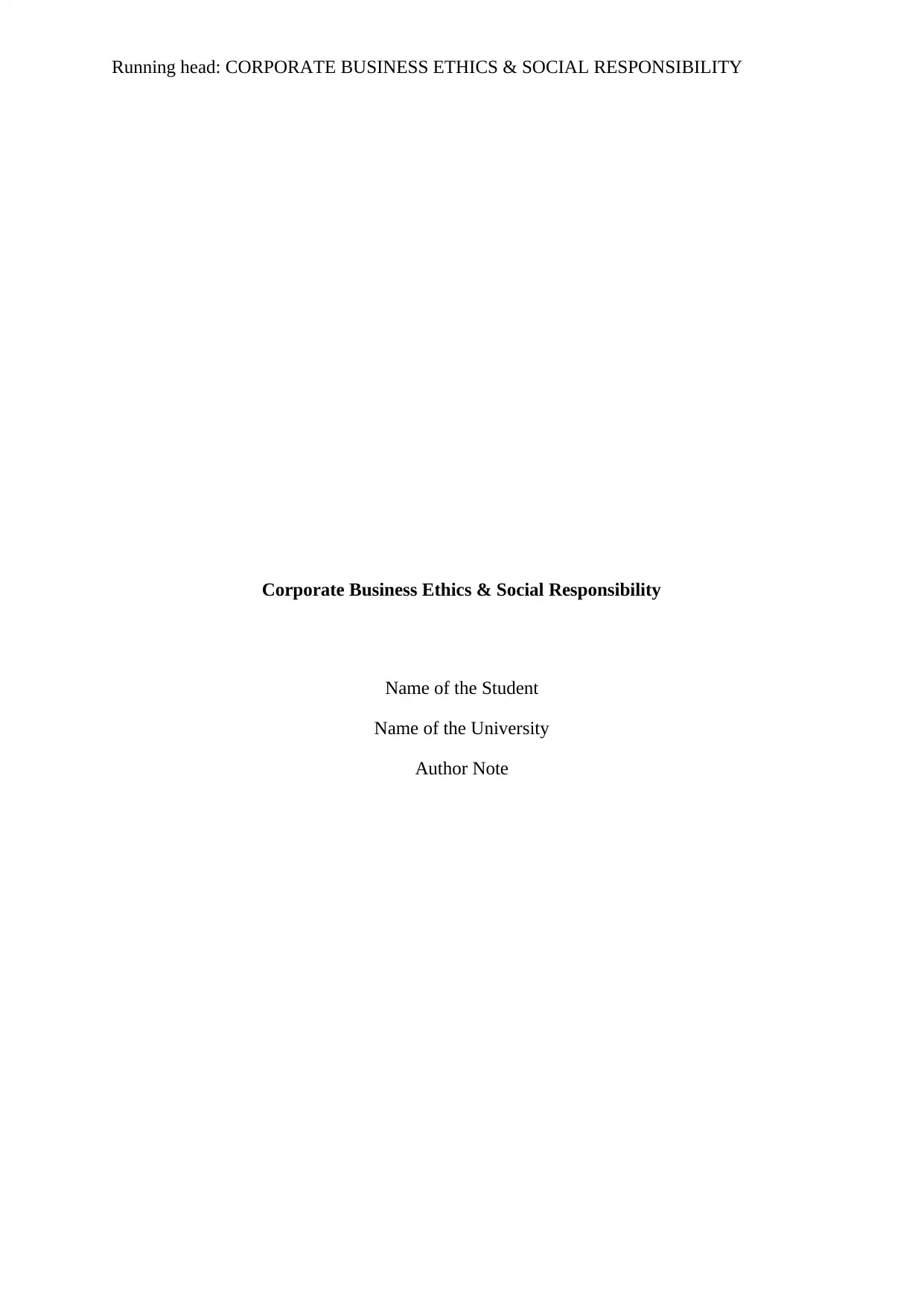
Running head: CORPORATE BUSINESS ETHICS & SOCIAL RESPONSIBILITY
Corporate Business Ethics & Social Responsibility
Name of the Student
Name of the University
Author Note
Corporate Business Ethics & Social Responsibility
Name of the Student
Name of the University
Author Note
Paraphrase This Document
Need a fresh take? Get an instant paraphrase of this document with our AI Paraphraser
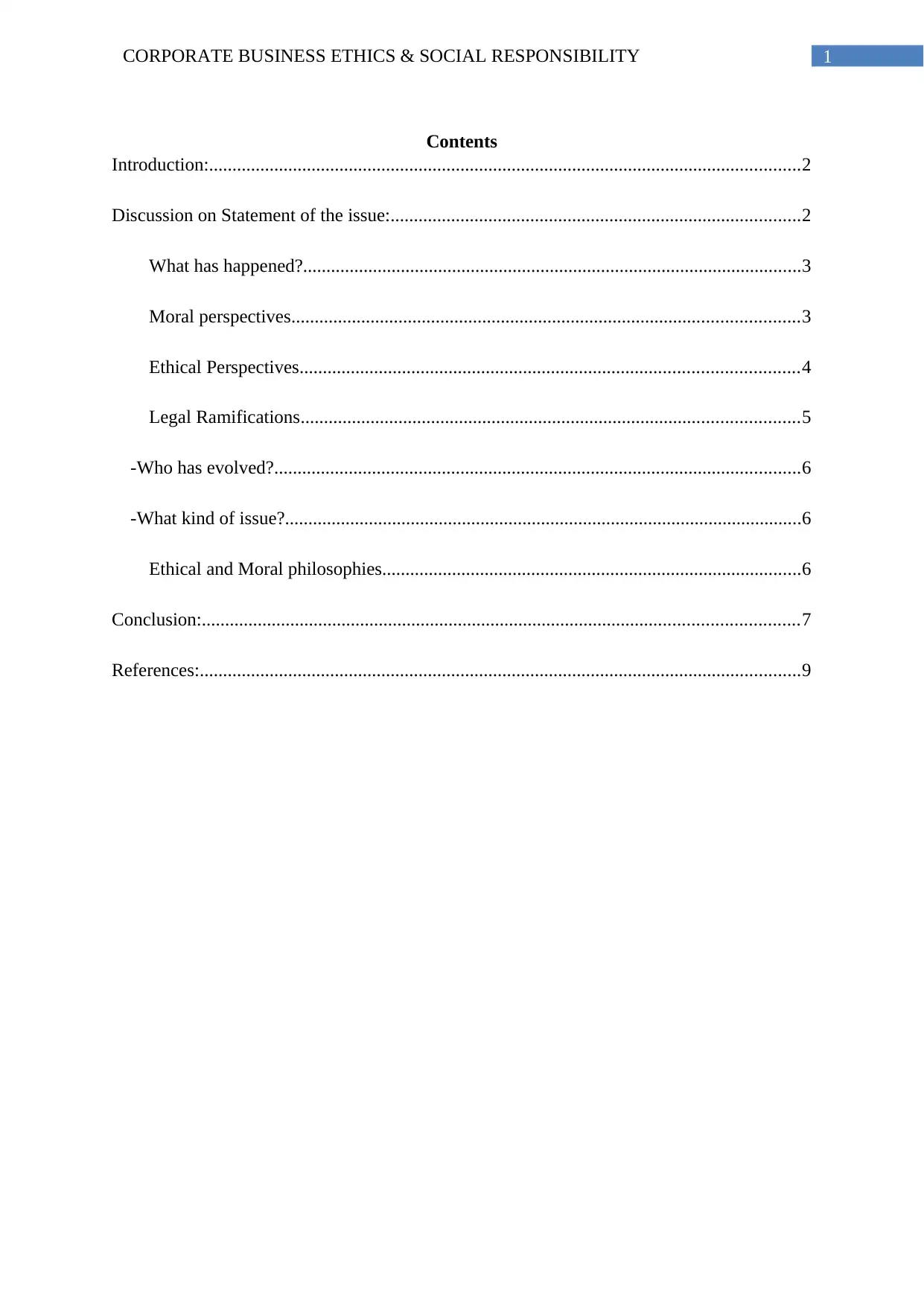
1CORPORATE BUSINESS ETHICS & SOCIAL RESPONSIBILITY
Contents
Introduction:...............................................................................................................................2
Discussion on Statement of the issue:........................................................................................2
What has happened?...........................................................................................................3
Moral perspectives.............................................................................................................3
Ethical Perspectives...........................................................................................................4
Legal Ramifications...........................................................................................................5
-Who has evolved?.................................................................................................................6
-What kind of issue?...............................................................................................................6
Ethical and Moral philosophies..........................................................................................6
Conclusion:................................................................................................................................7
References:.................................................................................................................................9
Contents
Introduction:...............................................................................................................................2
Discussion on Statement of the issue:........................................................................................2
What has happened?...........................................................................................................3
Moral perspectives.............................................................................................................3
Ethical Perspectives...........................................................................................................4
Legal Ramifications...........................................................................................................5
-Who has evolved?.................................................................................................................6
-What kind of issue?...............................................................................................................6
Ethical and Moral philosophies..........................................................................................6
Conclusion:................................................................................................................................7
References:.................................................................................................................................9
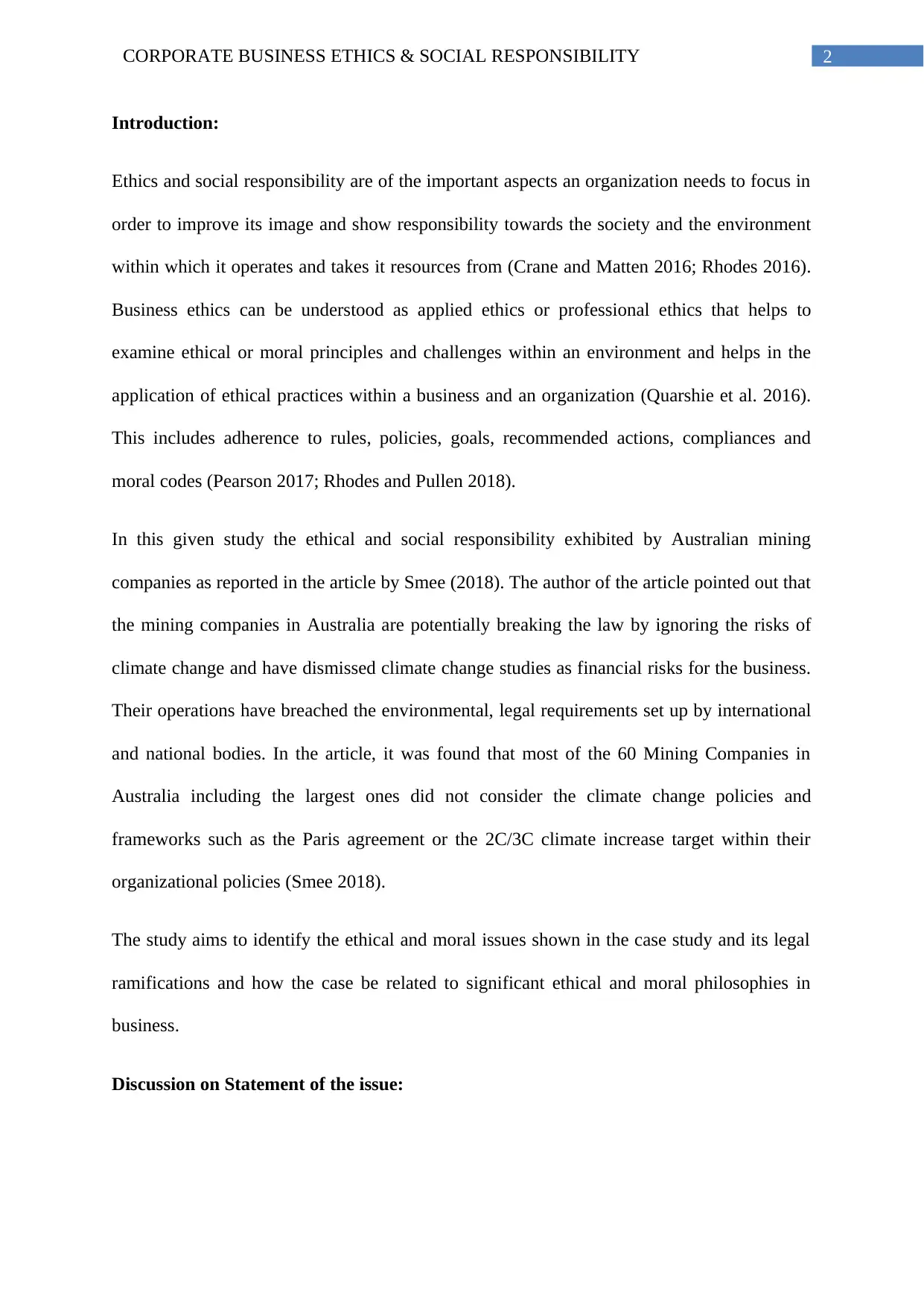
2CORPORATE BUSINESS ETHICS & SOCIAL RESPONSIBILITY
Introduction:
Ethics and social responsibility are of the important aspects an organization needs to focus in
order to improve its image and show responsibility towards the society and the environment
within which it operates and takes it resources from (Crane and Matten 2016; Rhodes 2016).
Business ethics can be understood as applied ethics or professional ethics that helps to
examine ethical or moral principles and challenges within an environment and helps in the
application of ethical practices within a business and an organization (Quarshie et al. 2016).
This includes adherence to rules, policies, goals, recommended actions, compliances and
moral codes (Pearson 2017; Rhodes and Pullen 2018).
In this given study the ethical and social responsibility exhibited by Australian mining
companies as reported in the article by Smee (2018). The author of the article pointed out that
the mining companies in Australia are potentially breaking the law by ignoring the risks of
climate change and have dismissed climate change studies as financial risks for the business.
Their operations have breached the environmental, legal requirements set up by international
and national bodies. In the article, it was found that most of the 60 Mining Companies in
Australia including the largest ones did not consider the climate change policies and
frameworks such as the Paris agreement or the 2C/3C climate increase target within their
organizational policies (Smee 2018).
The study aims to identify the ethical and moral issues shown in the case study and its legal
ramifications and how the case be related to significant ethical and moral philosophies in
business.
Discussion on Statement of the issue:
Introduction:
Ethics and social responsibility are of the important aspects an organization needs to focus in
order to improve its image and show responsibility towards the society and the environment
within which it operates and takes it resources from (Crane and Matten 2016; Rhodes 2016).
Business ethics can be understood as applied ethics or professional ethics that helps to
examine ethical or moral principles and challenges within an environment and helps in the
application of ethical practices within a business and an organization (Quarshie et al. 2016).
This includes adherence to rules, policies, goals, recommended actions, compliances and
moral codes (Pearson 2017; Rhodes and Pullen 2018).
In this given study the ethical and social responsibility exhibited by Australian mining
companies as reported in the article by Smee (2018). The author of the article pointed out that
the mining companies in Australia are potentially breaking the law by ignoring the risks of
climate change and have dismissed climate change studies as financial risks for the business.
Their operations have breached the environmental, legal requirements set up by international
and national bodies. In the article, it was found that most of the 60 Mining Companies in
Australia including the largest ones did not consider the climate change policies and
frameworks such as the Paris agreement or the 2C/3C climate increase target within their
organizational policies (Smee 2018).
The study aims to identify the ethical and moral issues shown in the case study and its legal
ramifications and how the case be related to significant ethical and moral philosophies in
business.
Discussion on Statement of the issue:
⊘ This is a preview!⊘
Do you want full access?
Subscribe today to unlock all pages.

Trusted by 1+ million students worldwide
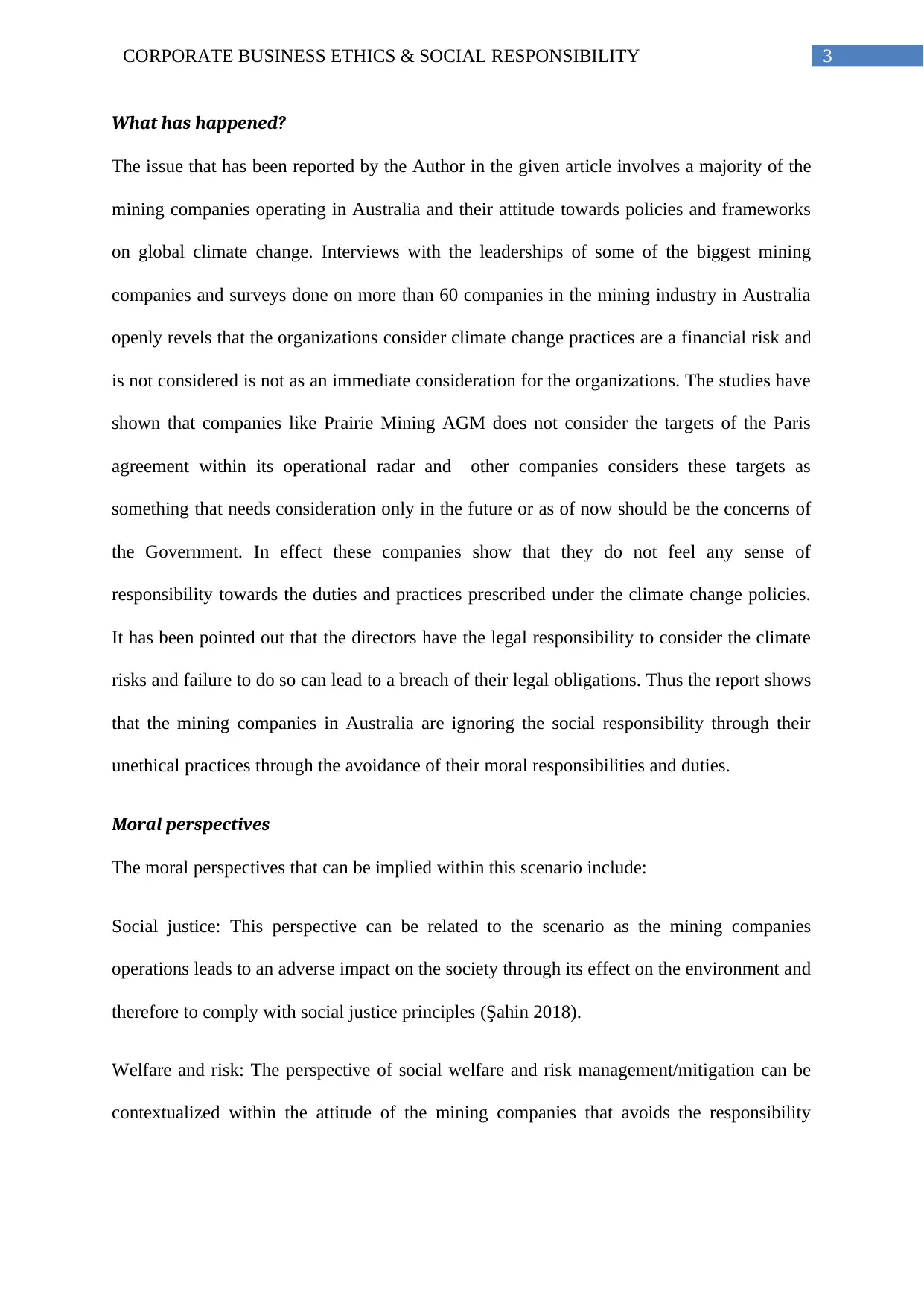
3CORPORATE BUSINESS ETHICS & SOCIAL RESPONSIBILITY
What has happened?
The issue that has been reported by the Author in the given article involves a majority of the
mining companies operating in Australia and their attitude towards policies and frameworks
on global climate change. Interviews with the leaderships of some of the biggest mining
companies and surveys done on more than 60 companies in the mining industry in Australia
openly revels that the organizations consider climate change practices are a financial risk and
is not considered is not as an immediate consideration for the organizations. The studies have
shown that companies like Prairie Mining AGM does not consider the targets of the Paris
agreement within its operational radar and other companies considers these targets as
something that needs consideration only in the future or as of now should be the concerns of
the Government. In effect these companies show that they do not feel any sense of
responsibility towards the duties and practices prescribed under the climate change policies.
It has been pointed out that the directors have the legal responsibility to consider the climate
risks and failure to do so can lead to a breach of their legal obligations. Thus the report shows
that the mining companies in Australia are ignoring the social responsibility through their
unethical practices through the avoidance of their moral responsibilities and duties.
Moral perspectives
The moral perspectives that can be implied within this scenario include:
Social justice: This perspective can be related to the scenario as the mining companies
operations leads to an adverse impact on the society through its effect on the environment and
therefore to comply with social justice principles (Şahin 2018).
Welfare and risk: The perspective of social welfare and risk management/mitigation can be
contextualized within the attitude of the mining companies that avoids the responsibility
What has happened?
The issue that has been reported by the Author in the given article involves a majority of the
mining companies operating in Australia and their attitude towards policies and frameworks
on global climate change. Interviews with the leaderships of some of the biggest mining
companies and surveys done on more than 60 companies in the mining industry in Australia
openly revels that the organizations consider climate change practices are a financial risk and
is not considered is not as an immediate consideration for the organizations. The studies have
shown that companies like Prairie Mining AGM does not consider the targets of the Paris
agreement within its operational radar and other companies considers these targets as
something that needs consideration only in the future or as of now should be the concerns of
the Government. In effect these companies show that they do not feel any sense of
responsibility towards the duties and practices prescribed under the climate change policies.
It has been pointed out that the directors have the legal responsibility to consider the climate
risks and failure to do so can lead to a breach of their legal obligations. Thus the report shows
that the mining companies in Australia are ignoring the social responsibility through their
unethical practices through the avoidance of their moral responsibilities and duties.
Moral perspectives
The moral perspectives that can be implied within this scenario include:
Social justice: This perspective can be related to the scenario as the mining companies
operations leads to an adverse impact on the society through its effect on the environment and
therefore to comply with social justice principles (Şahin 2018).
Welfare and risk: The perspective of social welfare and risk management/mitigation can be
contextualized within the attitude of the mining companies that avoids the responsibility
Paraphrase This Document
Need a fresh take? Get an instant paraphrase of this document with our AI Paraphraser
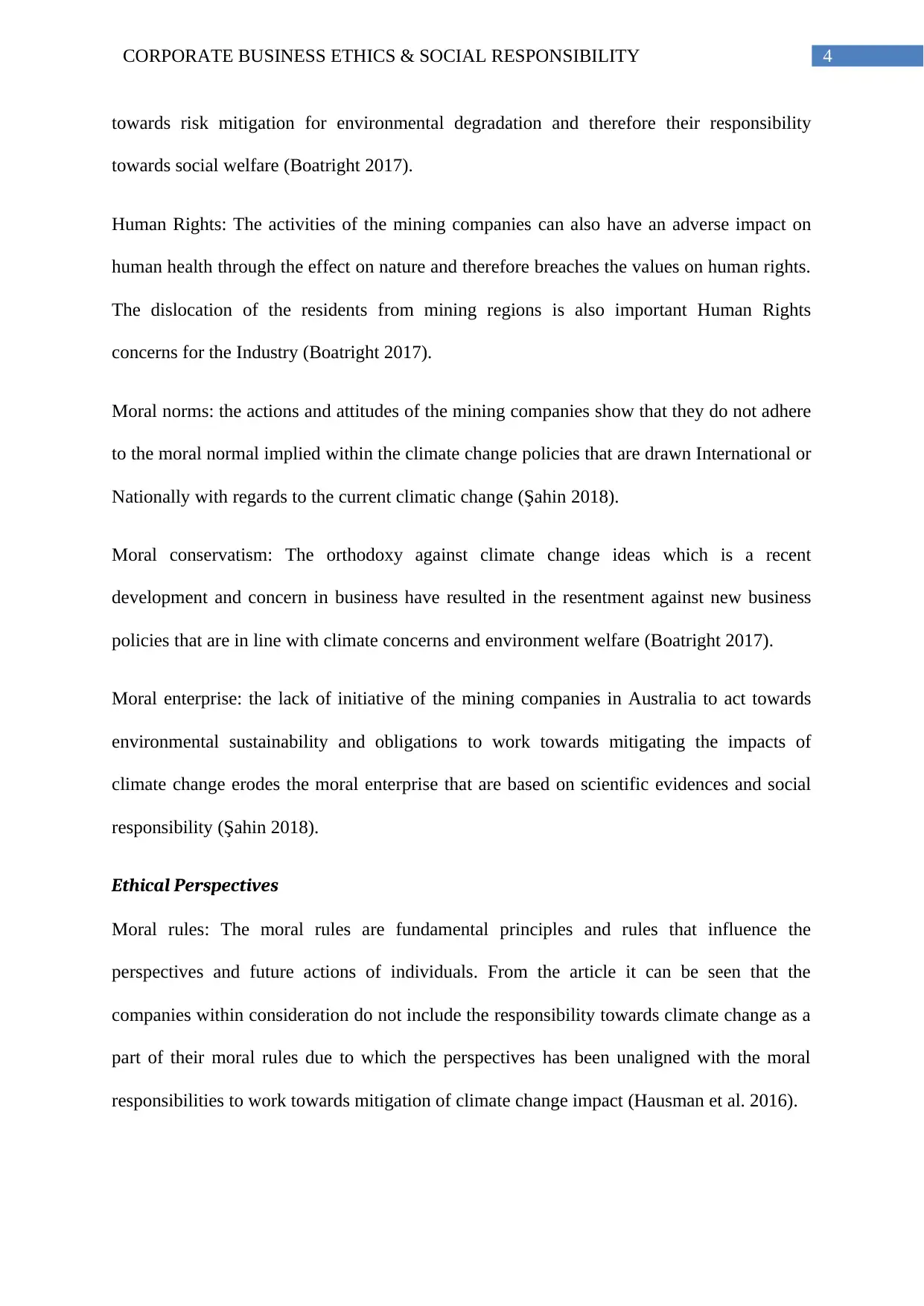
4CORPORATE BUSINESS ETHICS & SOCIAL RESPONSIBILITY
towards risk mitigation for environmental degradation and therefore their responsibility
towards social welfare (Boatright 2017).
Human Rights: The activities of the mining companies can also have an adverse impact on
human health through the effect on nature and therefore breaches the values on human rights.
The dislocation of the residents from mining regions is also important Human Rights
concerns for the Industry (Boatright 2017).
Moral norms: the actions and attitudes of the mining companies show that they do not adhere
to the moral normal implied within the climate change policies that are drawn International or
Nationally with regards to the current climatic change (Şahin 2018).
Moral conservatism: The orthodoxy against climate change ideas which is a recent
development and concern in business have resulted in the resentment against new business
policies that are in line with climate concerns and environment welfare (Boatright 2017).
Moral enterprise: the lack of initiative of the mining companies in Australia to act towards
environmental sustainability and obligations to work towards mitigating the impacts of
climate change erodes the moral enterprise that are based on scientific evidences and social
responsibility (Şahin 2018).
Ethical Perspectives
Moral rules: The moral rules are fundamental principles and rules that influence the
perspectives and future actions of individuals. From the article it can be seen that the
companies within consideration do not include the responsibility towards climate change as a
part of their moral rules due to which the perspectives has been unaligned with the moral
responsibilities to work towards mitigation of climate change impact (Hausman et al. 2016).
towards risk mitigation for environmental degradation and therefore their responsibility
towards social welfare (Boatright 2017).
Human Rights: The activities of the mining companies can also have an adverse impact on
human health through the effect on nature and therefore breaches the values on human rights.
The dislocation of the residents from mining regions is also important Human Rights
concerns for the Industry (Boatright 2017).
Moral norms: the actions and attitudes of the mining companies show that they do not adhere
to the moral normal implied within the climate change policies that are drawn International or
Nationally with regards to the current climatic change (Şahin 2018).
Moral conservatism: The orthodoxy against climate change ideas which is a recent
development and concern in business have resulted in the resentment against new business
policies that are in line with climate concerns and environment welfare (Boatright 2017).
Moral enterprise: the lack of initiative of the mining companies in Australia to act towards
environmental sustainability and obligations to work towards mitigating the impacts of
climate change erodes the moral enterprise that are based on scientific evidences and social
responsibility (Şahin 2018).
Ethical Perspectives
Moral rules: The moral rules are fundamental principles and rules that influence the
perspectives and future actions of individuals. From the article it can be seen that the
companies within consideration do not include the responsibility towards climate change as a
part of their moral rules due to which the perspectives has been unaligned with the moral
responsibilities to work towards mitigation of climate change impact (Hausman et al. 2016).
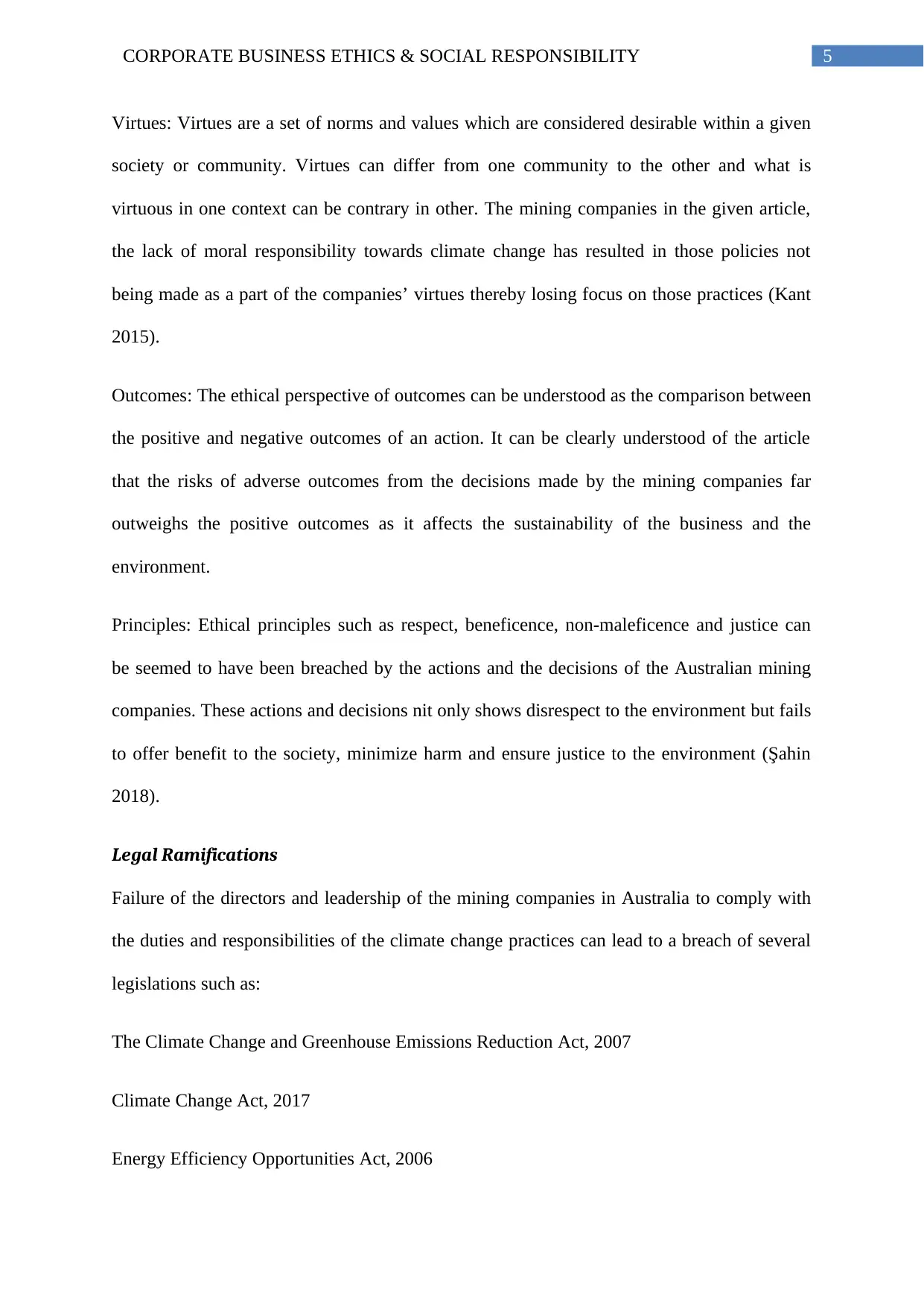
5CORPORATE BUSINESS ETHICS & SOCIAL RESPONSIBILITY
Virtues: Virtues are a set of norms and values which are considered desirable within a given
society or community. Virtues can differ from one community to the other and what is
virtuous in one context can be contrary in other. The mining companies in the given article,
the lack of moral responsibility towards climate change has resulted in those policies not
being made as a part of the companies’ virtues thereby losing focus on those practices (Kant
2015).
Outcomes: The ethical perspective of outcomes can be understood as the comparison between
the positive and negative outcomes of an action. It can be clearly understood of the article
that the risks of adverse outcomes from the decisions made by the mining companies far
outweighs the positive outcomes as it affects the sustainability of the business and the
environment.
Principles: Ethical principles such as respect, beneficence, non-maleficence and justice can
be seemed to have been breached by the actions and the decisions of the Australian mining
companies. These actions and decisions nit only shows disrespect to the environment but fails
to offer benefit to the society, minimize harm and ensure justice to the environment (Şahin
2018).
Legal Ramifications
Failure of the directors and leadership of the mining companies in Australia to comply with
the duties and responsibilities of the climate change practices can lead to a breach of several
legislations such as:
The Climate Change and Greenhouse Emissions Reduction Act, 2007
Climate Change Act, 2017
Energy Efficiency Opportunities Act, 2006
Virtues: Virtues are a set of norms and values which are considered desirable within a given
society or community. Virtues can differ from one community to the other and what is
virtuous in one context can be contrary in other. The mining companies in the given article,
the lack of moral responsibility towards climate change has resulted in those policies not
being made as a part of the companies’ virtues thereby losing focus on those practices (Kant
2015).
Outcomes: The ethical perspective of outcomes can be understood as the comparison between
the positive and negative outcomes of an action. It can be clearly understood of the article
that the risks of adverse outcomes from the decisions made by the mining companies far
outweighs the positive outcomes as it affects the sustainability of the business and the
environment.
Principles: Ethical principles such as respect, beneficence, non-maleficence and justice can
be seemed to have been breached by the actions and the decisions of the Australian mining
companies. These actions and decisions nit only shows disrespect to the environment but fails
to offer benefit to the society, minimize harm and ensure justice to the environment (Şahin
2018).
Legal Ramifications
Failure of the directors and leadership of the mining companies in Australia to comply with
the duties and responsibilities of the climate change practices can lead to a breach of several
legislations such as:
The Climate Change and Greenhouse Emissions Reduction Act, 2007
Climate Change Act, 2017
Energy Efficiency Opportunities Act, 2006
⊘ This is a preview!⊘
Do you want full access?
Subscribe today to unlock all pages.

Trusted by 1+ million students worldwide
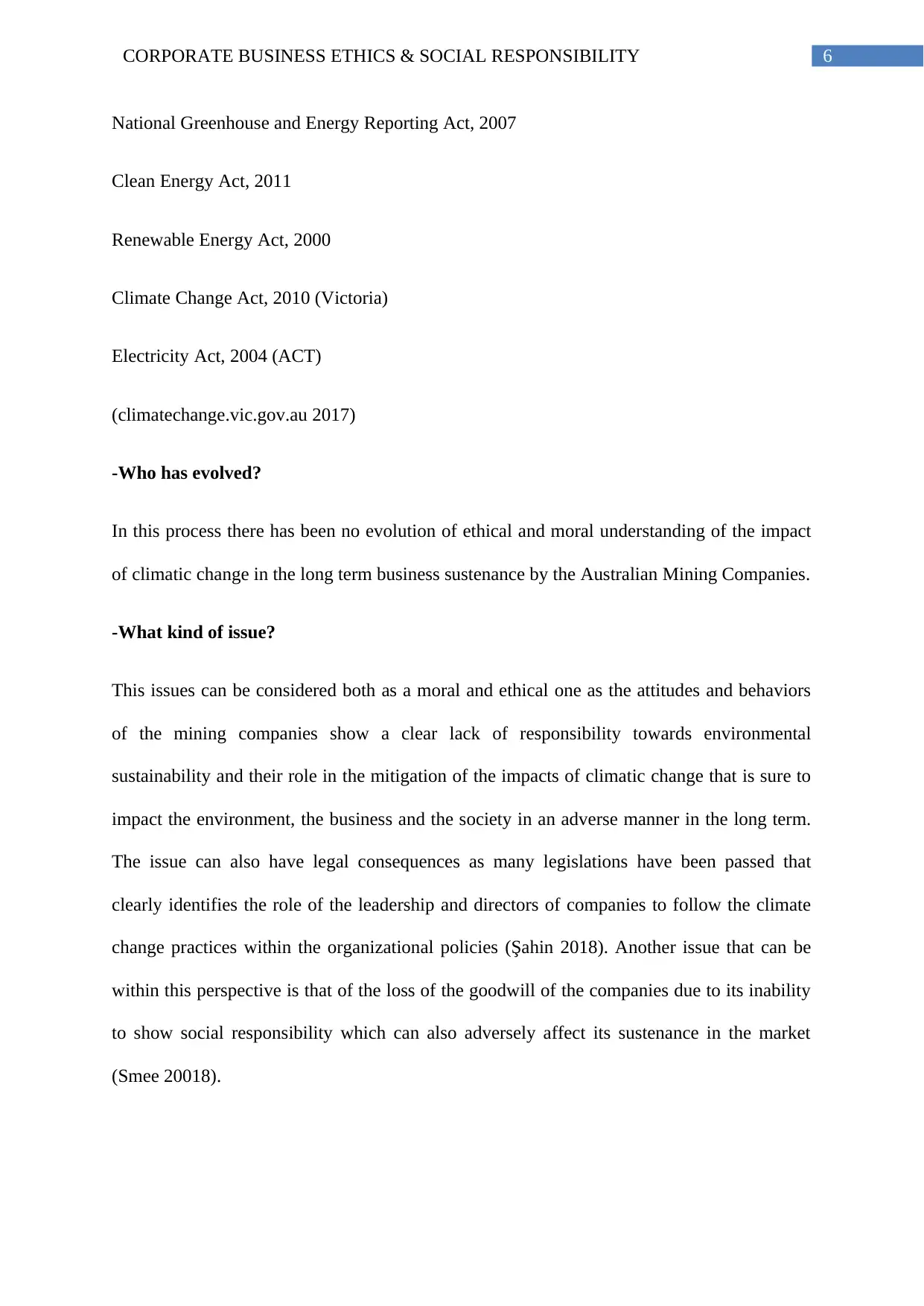
6CORPORATE BUSINESS ETHICS & SOCIAL RESPONSIBILITY
National Greenhouse and Energy Reporting Act, 2007
Clean Energy Act, 2011
Renewable Energy Act, 2000
Climate Change Act, 2010 (Victoria)
Electricity Act, 2004 (ACT)
(climatechange.vic.gov.au 2017)
-Who has evolved?
In this process there has been no evolution of ethical and moral understanding of the impact
of climatic change in the long term business sustenance by the Australian Mining Companies.
-What kind of issue?
This issues can be considered both as a moral and ethical one as the attitudes and behaviors
of the mining companies show a clear lack of responsibility towards environmental
sustainability and their role in the mitigation of the impacts of climatic change that is sure to
impact the environment, the business and the society in an adverse manner in the long term.
The issue can also have legal consequences as many legislations have been passed that
clearly identifies the role of the leadership and directors of companies to follow the climate
change practices within the organizational policies (Şahin 2018). Another issue that can be
within this perspective is that of the loss of the goodwill of the companies due to its inability
to show social responsibility which can also adversely affect its sustenance in the market
(Smee 20018).
National Greenhouse and Energy Reporting Act, 2007
Clean Energy Act, 2011
Renewable Energy Act, 2000
Climate Change Act, 2010 (Victoria)
Electricity Act, 2004 (ACT)
(climatechange.vic.gov.au 2017)
-Who has evolved?
In this process there has been no evolution of ethical and moral understanding of the impact
of climatic change in the long term business sustenance by the Australian Mining Companies.
-What kind of issue?
This issues can be considered both as a moral and ethical one as the attitudes and behaviors
of the mining companies show a clear lack of responsibility towards environmental
sustainability and their role in the mitigation of the impacts of climatic change that is sure to
impact the environment, the business and the society in an adverse manner in the long term.
The issue can also have legal consequences as many legislations have been passed that
clearly identifies the role of the leadership and directors of companies to follow the climate
change practices within the organizational policies (Şahin 2018). Another issue that can be
within this perspective is that of the loss of the goodwill of the companies due to its inability
to show social responsibility which can also adversely affect its sustenance in the market
(Smee 20018).
Paraphrase This Document
Need a fresh take? Get an instant paraphrase of this document with our AI Paraphraser
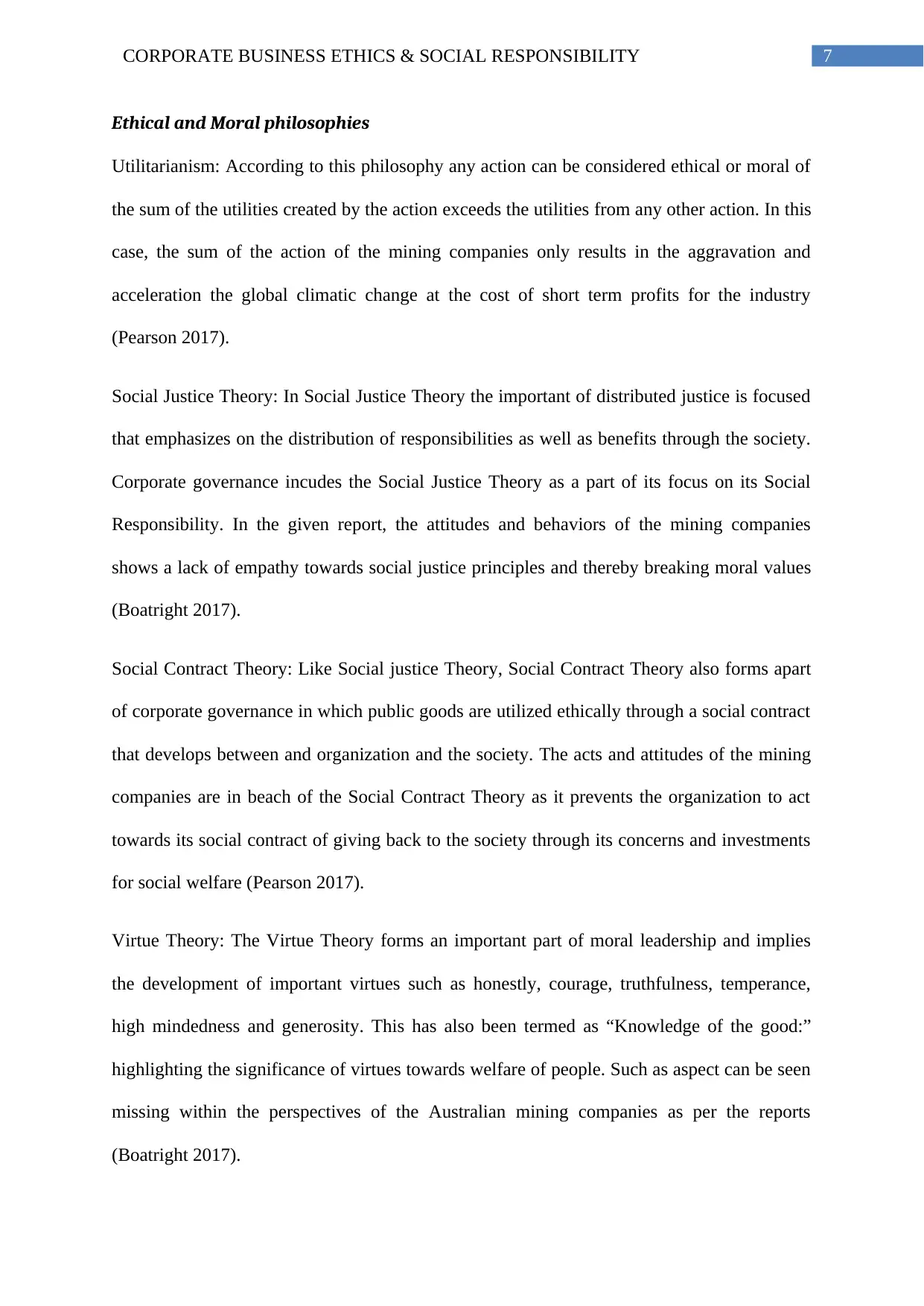
7CORPORATE BUSINESS ETHICS & SOCIAL RESPONSIBILITY
Ethical and Moral philosophies
Utilitarianism: According to this philosophy any action can be considered ethical or moral of
the sum of the utilities created by the action exceeds the utilities from any other action. In this
case, the sum of the action of the mining companies only results in the aggravation and
acceleration the global climatic change at the cost of short term profits for the industry
(Pearson 2017).
Social Justice Theory: In Social Justice Theory the important of distributed justice is focused
that emphasizes on the distribution of responsibilities as well as benefits through the society.
Corporate governance incudes the Social Justice Theory as a part of its focus on its Social
Responsibility. In the given report, the attitudes and behaviors of the mining companies
shows a lack of empathy towards social justice principles and thereby breaking moral values
(Boatright 2017).
Social Contract Theory: Like Social justice Theory, Social Contract Theory also forms apart
of corporate governance in which public goods are utilized ethically through a social contract
that develops between and organization and the society. The acts and attitudes of the mining
companies are in beach of the Social Contract Theory as it prevents the organization to act
towards its social contract of giving back to the society through its concerns and investments
for social welfare (Pearson 2017).
Virtue Theory: The Virtue Theory forms an important part of moral leadership and implies
the development of important virtues such as honestly, courage, truthfulness, temperance,
high mindedness and generosity. This has also been termed as “Knowledge of the good:”
highlighting the significance of virtues towards welfare of people. Such as aspect can be seen
missing within the perspectives of the Australian mining companies as per the reports
(Boatright 2017).
Ethical and Moral philosophies
Utilitarianism: According to this philosophy any action can be considered ethical or moral of
the sum of the utilities created by the action exceeds the utilities from any other action. In this
case, the sum of the action of the mining companies only results in the aggravation and
acceleration the global climatic change at the cost of short term profits for the industry
(Pearson 2017).
Social Justice Theory: In Social Justice Theory the important of distributed justice is focused
that emphasizes on the distribution of responsibilities as well as benefits through the society.
Corporate governance incudes the Social Justice Theory as a part of its focus on its Social
Responsibility. In the given report, the attitudes and behaviors of the mining companies
shows a lack of empathy towards social justice principles and thereby breaking moral values
(Boatright 2017).
Social Contract Theory: Like Social justice Theory, Social Contract Theory also forms apart
of corporate governance in which public goods are utilized ethically through a social contract
that develops between and organization and the society. The acts and attitudes of the mining
companies are in beach of the Social Contract Theory as it prevents the organization to act
towards its social contract of giving back to the society through its concerns and investments
for social welfare (Pearson 2017).
Virtue Theory: The Virtue Theory forms an important part of moral leadership and implies
the development of important virtues such as honestly, courage, truthfulness, temperance,
high mindedness and generosity. This has also been termed as “Knowledge of the good:”
highlighting the significance of virtues towards welfare of people. Such as aspect can be seen
missing within the perspectives of the Australian mining companies as per the reports
(Boatright 2017).
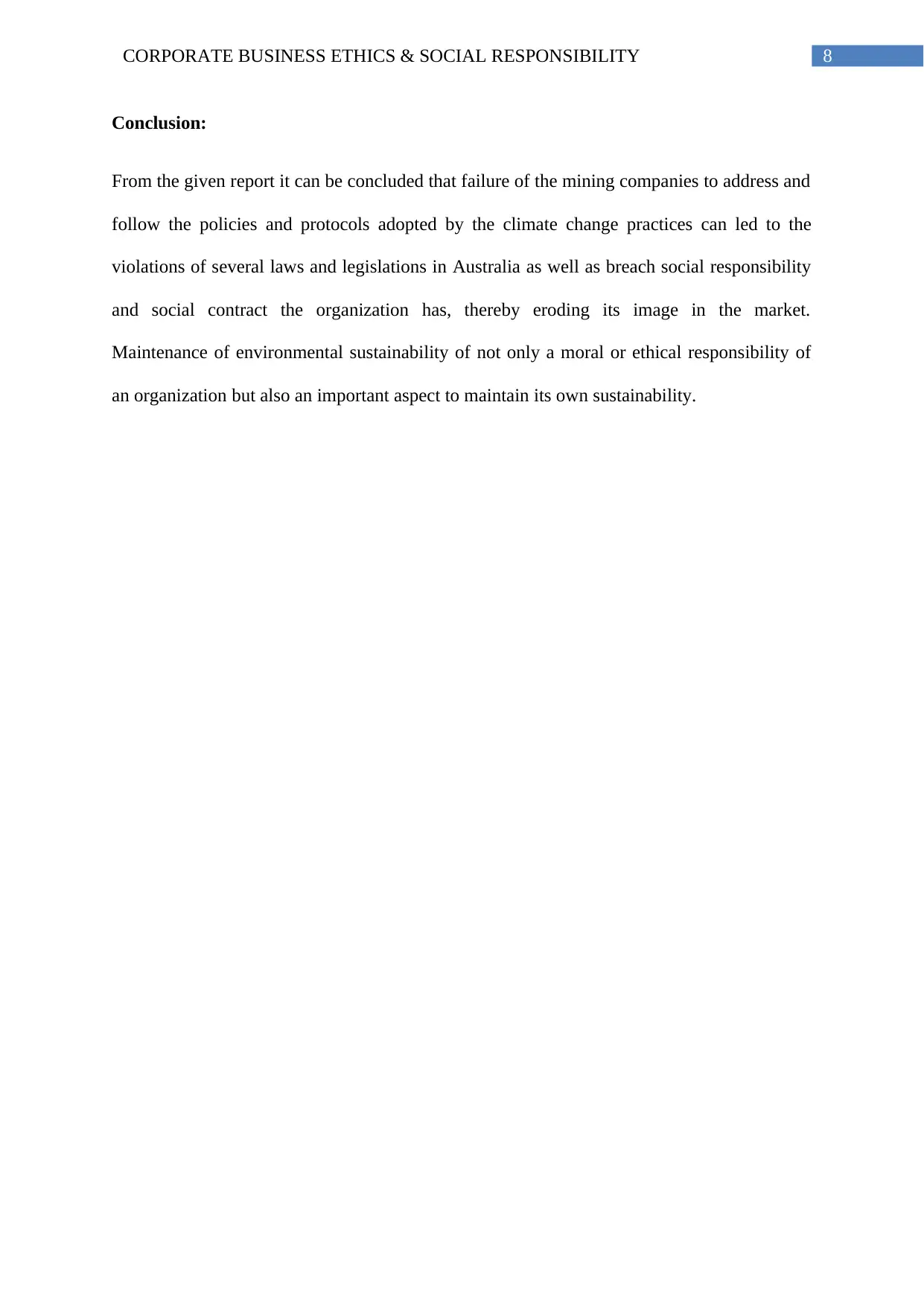
8CORPORATE BUSINESS ETHICS & SOCIAL RESPONSIBILITY
Conclusion:
From the given report it can be concluded that failure of the mining companies to address and
follow the policies and protocols adopted by the climate change practices can led to the
violations of several laws and legislations in Australia as well as breach social responsibility
and social contract the organization has, thereby eroding its image in the market.
Maintenance of environmental sustainability of not only a moral or ethical responsibility of
an organization but also an important aspect to maintain its own sustainability.
Conclusion:
From the given report it can be concluded that failure of the mining companies to address and
follow the policies and protocols adopted by the climate change practices can led to the
violations of several laws and legislations in Australia as well as breach social responsibility
and social contract the organization has, thereby eroding its image in the market.
Maintenance of environmental sustainability of not only a moral or ethical responsibility of
an organization but also an important aspect to maintain its own sustainability.
⊘ This is a preview!⊘
Do you want full access?
Subscribe today to unlock all pages.

Trusted by 1+ million students worldwide
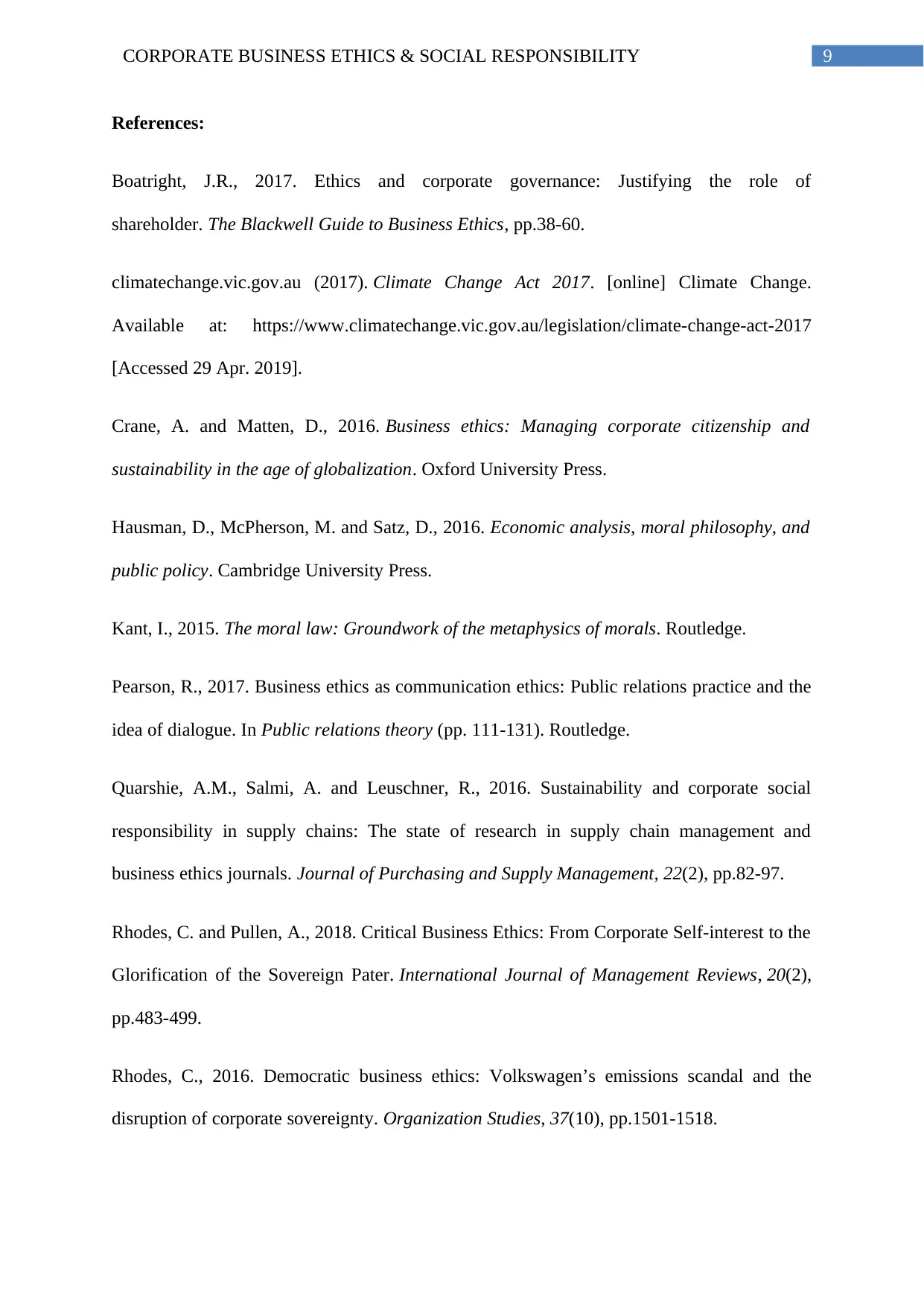
9CORPORATE BUSINESS ETHICS & SOCIAL RESPONSIBILITY
References:
Boatright, J.R., 2017. Ethics and corporate governance: Justifying the role of
shareholder. The Blackwell Guide to Business Ethics, pp.38-60.
climatechange.vic.gov.au (2017). Climate Change Act 2017. [online] Climate Change.
Available at: https://www.climatechange.vic.gov.au/legislation/climate-change-act-2017
[Accessed 29 Apr. 2019].
Crane, A. and Matten, D., 2016. Business ethics: Managing corporate citizenship and
sustainability in the age of globalization. Oxford University Press.
Hausman, D., McPherson, M. and Satz, D., 2016. Economic analysis, moral philosophy, and
public policy. Cambridge University Press.
Kant, I., 2015. The moral law: Groundwork of the metaphysics of morals. Routledge.
Pearson, R., 2017. Business ethics as communication ethics: Public relations practice and the
idea of dialogue. In Public relations theory (pp. 111-131). Routledge.
Quarshie, A.M., Salmi, A. and Leuschner, R., 2016. Sustainability and corporate social
responsibility in supply chains: The state of research in supply chain management and
business ethics journals. Journal of Purchasing and Supply Management, 22(2), pp.82-97.
Rhodes, C. and Pullen, A., 2018. Critical Business Ethics: From Corporate Self‐interest to the
Glorification of the Sovereign Pater. International Journal of Management Reviews, 20(2),
pp.483-499.
Rhodes, C., 2016. Democratic business ethics: Volkswagen’s emissions scandal and the
disruption of corporate sovereignty. Organization Studies, 37(10), pp.1501-1518.
References:
Boatright, J.R., 2017. Ethics and corporate governance: Justifying the role of
shareholder. The Blackwell Guide to Business Ethics, pp.38-60.
climatechange.vic.gov.au (2017). Climate Change Act 2017. [online] Climate Change.
Available at: https://www.climatechange.vic.gov.au/legislation/climate-change-act-2017
[Accessed 29 Apr. 2019].
Crane, A. and Matten, D., 2016. Business ethics: Managing corporate citizenship and
sustainability in the age of globalization. Oxford University Press.
Hausman, D., McPherson, M. and Satz, D., 2016. Economic analysis, moral philosophy, and
public policy. Cambridge University Press.
Kant, I., 2015. The moral law: Groundwork of the metaphysics of morals. Routledge.
Pearson, R., 2017. Business ethics as communication ethics: Public relations practice and the
idea of dialogue. In Public relations theory (pp. 111-131). Routledge.
Quarshie, A.M., Salmi, A. and Leuschner, R., 2016. Sustainability and corporate social
responsibility in supply chains: The state of research in supply chain management and
business ethics journals. Journal of Purchasing and Supply Management, 22(2), pp.82-97.
Rhodes, C. and Pullen, A., 2018. Critical Business Ethics: From Corporate Self‐interest to the
Glorification of the Sovereign Pater. International Journal of Management Reviews, 20(2),
pp.483-499.
Rhodes, C., 2016. Democratic business ethics: Volkswagen’s emissions scandal and the
disruption of corporate sovereignty. Organization Studies, 37(10), pp.1501-1518.
Paraphrase This Document
Need a fresh take? Get an instant paraphrase of this document with our AI Paraphraser
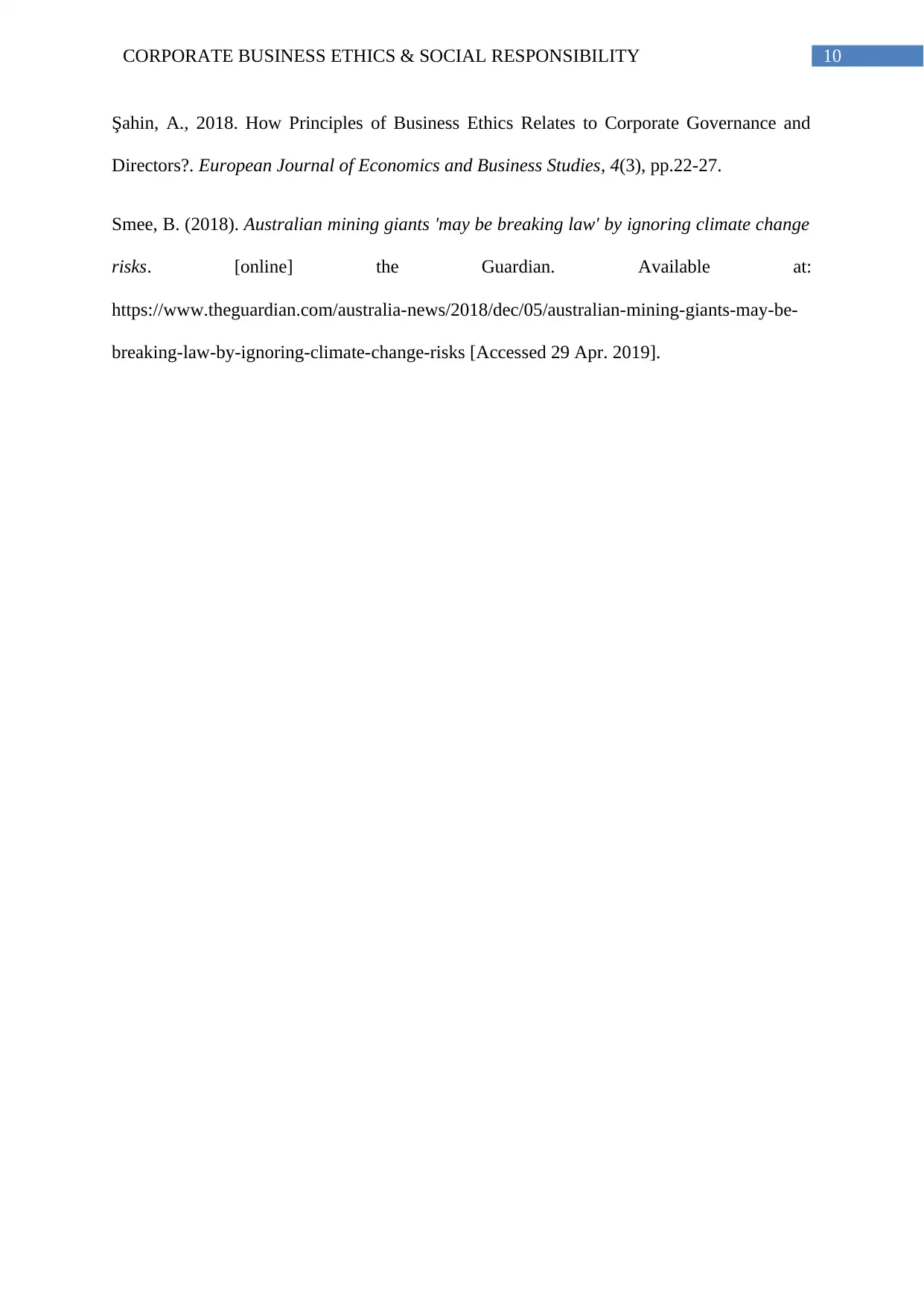
10CORPORATE BUSINESS ETHICS & SOCIAL RESPONSIBILITY
Şahin, A., 2018. How Principles of Business Ethics Relates to Corporate Governance and
Directors?. European Journal of Economics and Business Studies, 4(3), pp.22-27.
Smee, B. (2018). Australian mining giants 'may be breaking law' by ignoring climate change
risks. [online] the Guardian. Available at:
https://www.theguardian.com/australia-news/2018/dec/05/australian-mining-giants-may-be-
breaking-law-by-ignoring-climate-change-risks [Accessed 29 Apr. 2019].
Şahin, A., 2018. How Principles of Business Ethics Relates to Corporate Governance and
Directors?. European Journal of Economics and Business Studies, 4(3), pp.22-27.
Smee, B. (2018). Australian mining giants 'may be breaking law' by ignoring climate change
risks. [online] the Guardian. Available at:
https://www.theguardian.com/australia-news/2018/dec/05/australian-mining-giants-may-be-
breaking-law-by-ignoring-climate-change-risks [Accessed 29 Apr. 2019].
1 out of 11
Related Documents
Your All-in-One AI-Powered Toolkit for Academic Success.
+13062052269
info@desklib.com
Available 24*7 on WhatsApp / Email
![[object Object]](/_next/static/media/star-bottom.7253800d.svg)
Unlock your academic potential
Copyright © 2020–2026 A2Z Services. All Rights Reserved. Developed and managed by ZUCOL.





